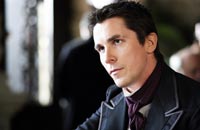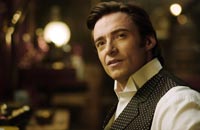Everyone has heard that a good magician never reveals a secret. In The Prestige, a young enthusiast learns from an old hand the reason for this rule. “No one respects you for a secret, no matter how good it is,” the magician explains. “It’s what you can do with the secret that they respect you for.”
Ah, but it’s different at the movies. For a filmmaker, a good secret revealed in the right way at the right moment can be the highlight of the act. Like a magician, the filmmaker can use misdirection to get the audience looking the other way, in order to make the climax as surprising as possible. But where the magician wants to leave the audience mystified, the filmmaker seeks to pull all the pieces together.
Adapted by director Christopher Nolan and his brother Jonathan from the Christopher Priest novel, The Prestige has a number of secrets, cleverly wrought and carefully structured in an escalating series of dramatic revelations that may need multiple viewings to fully unravel. Tightly plotted and thematically well-crafted, the film offers converging lessons regarding seemingly harmless illusions that belie grim realities, charades that must be maintained off the stage as well as on, and the hazards of an all-important secret confederate, all coming together in climactic plot twists both haunting and unsettling.
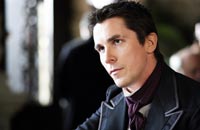
At the same time, underlying the whole story is a central conceit that—while undeniably integral to the tale the film has to tell—may seem somewhat jarring amid the movie’s 19th-century trappings of escape-artist water tanks, collapsible bird cages, hidden trapdoors, and the like. Granted its premise, The Prestige is ruthlessly bold and clever regarding the implications and consequences for its antagonists, rival London magicians Robert Angier (Hugh Jackman) and Alfred Borden (Christian Bale). The premise, though, is a lot to swallow.
Coming a couple of months after the similarly themed The Illusionist, The Prestige is the year’s second Victorian-era stage-magic thriller centering on a deadly competition between a magician and his rival. The Illusionist pitted magician Edward Norton against a prince played by Rufus Sewell; The Prestige features a contest of peers, if not equals, that offers more opportunity for ever-mounting one-upmanship and direct rivalry.
The similarities to The Illusionist don’t stop there. In both films, there is a woman caught between the two men, a tragic turn of events, and ultimately a question of real magic as the movie toys with life and death. Both feature strong casts and bring outstanding production values to the period setting; both also rely on expert magician and magic consultant Ricky Jay for stage cred in the performance of the magic.
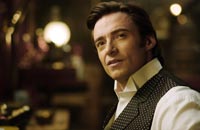
Both films also emulate the three-part structure of a magic trick, as outlined by Cutter in an opening voiceover. In old-school magic parlance, the three acts are called the Pledge, the Turn, and the Prestige. The Pledge offers the audience assurances that nothing funny is going on (please shuffle the cards yourself; nothing up my sleeve, etc.). The Turn is the moment when something extraordinary happens (and the hankerchief is gone!). The third act, the Prestige, seals the deal—brings the handkerchief back, say. “It’s not enough to make something disappear,” Cutter explains. “You have to bring it back.”
Beneath the surface similarities, though, the two films have very different hearts. The Illusionist is essentially a rationalized fairy tale with a hero, a villain, a princess, and true love. The Prestige—like Nolan’s earlier puzzle movie, the celebrated Memento—is a brilliantly interconnected but chilly mechanism in which each element is a carefully integrated part of the whole, but the effect of the whole is somewhat alienating.
As with Memento, the story is set in motion when a protagonist suffers a crushing tragedy, leading to an increasingly destructive vendetta against a character who may or may not be responsible.
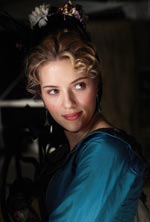
In the beginning, Angier and Borden are colleagues in the London magic scene, incognito audience “plants” in a magic act who “volunteer” every night until a fateful performance that closes the show and leaves the former partners estranged.
In almost every way, the two men are opposites: Angier is upper class, poised, more a gifted showman than an inspired illusionist; Borden, a Cockney, is working-class and unpolished, but with a deep affinity for the art that eludes his rival. Their rivalry takes various forms: direct acts of revenge and sabotage, efforts to upstage one another’s careers, elaborate coded messages taunting one another, even affairs with the same woman, Olivia (Scarlett Johansson), who acts as assistant and double agent to both men.
Angier’s hatred for Borden over their shared history deepens into envy and resentment over the latter’s apparent domestic happiness; later, discovering that Borden isn’t really the settled family man he seems to be, Angier despises his rival even more.
Is Borden too much in love with magic to give himself completely to his wife Sarah (Rebecca Hall)? Or is the problem more complicated than that? Sarah quizzically eyes her husband when he tells her he loves her. “Not today,” she says with resigned acceptance. She can always tell: Some days, she’s convinced he loves her more than magic; other days it’s the other way around. She seems willing to live with this part-time love, though it hurts even on the good days, when he tells her he loves her and means it: “It makes it that much harder when you don’t.”
Most infuriatingly to Angier, Borden develops an astounding trick that no one can explain or duplicate. Called “The Transported Man,” the effect is so simple that audiences are almost too bewildered to know how to respond. Angier, of course, could dress it up better—if he could do it at all.
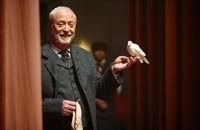
Cutter (Michael Caine), a veteran ingeneur or designer of illusions with whom both rivals work at various times, swears there’s no way to do the trick without a body double—but Angier would stake his life that it’s the same man. Eventually, with Cutter’s help, Angier debuts a slicker version of “The Transported Man,” but the effect is less than satisfactory, especially to Angier himself. Increasingly obsessed with learning Borden’s secrets, Angier eventually puts up his assistant and mistress Olivia to go to work for Borden in order to steal his secrets.
Somewhat oddly juxtaposed with all this, yet inseparable from it, is a subplot involving a historical figure, American scientist Nikola Tesla (David Bowie), an important inventor and physicist whose own rivalry with an accomplished peer, Thomas Alva Edison, is alluded to in the film. (Edison championed direct current, but Tesla’s alternating current standard was superior, and won out.)
Angier and Borden each make pilgrimages to Tesla’s Colorado Springs workshop to petition the scientist to build an extraordinary machine for their magic acts. It is here that the film threatens to break down: Tesla’s reputation as a “wizard” of science notwithstanding, his presence in the film, and the machine he builds, isn’t successfully integrated into the fabric of the story.
In spite of this incongruity, Nolan makes it pay off, in spades. The device itself doesn’t fit into the world of the story, but what the characters do with it does. It’s a story flaw, but a flaw that has been turned to advantage, like a crack in a marble slab that the sculptor somehow finds a way to make serve the statue.
If only the characters themselves were more interesting, or even more likeable. If only the story had something decent at its center, rather than being a tightly wound Möbius strip with a dark side that just keeps going and has no other side.
Talk About It
Discussion starters- Both Angier and Borden do very immoral things. Do you think either is more compromised than the other? Does the balance go back and forth
- Does the movie sympathize more with one rival than the other? If so, do the movie’s sympathies correlate in any way to the moral standing of the characters
- Cutter says no one cares about the man who goes into the box, only the man who comes out. Does the movie offer any evidence that supports this claim? Does it offer any evidence contrary to it
- Cutter points out how dangerous tricks (water escapes, bullet catches) attract an audience hoping to see an accident. What other forms of entertainment pose a high level of risk to the performer? Can this make such entertainment morally problematic? Can you think of any examples?
The Family Corner
For parents to considerThe Prestige is rated PG-13 for violence and some disturbing imagery. The violence is sometimes deadly and includes gunplay, a hanging and a suicide, as well as repeated images of drowning. There are also implied affairs and some brief sensuality.
Photos © Copyright Touchstone & Warner Bros
Copyright © 2006 Christianity Today. Click for reprint information.
What Other Critics Are Saying
compiled by Jeffrey Overstreetfrom Film Forum, 10/26/06Christian Bale. Michael Caine. Director Christopher Nolan. Sounds like the next Batman movie, right?
While that fabulous team is indeed preparing to bring back Batman in 2007’s The Dark Knight, starring Heath Ledger as The Joker, you don’t have to wait to see them together again on the big screen.
Nolan’s The Prestige pits two magicians—played by Bale and Hugh Jackman—against one another in a battle for superiority and, of course, the heart of a girl. The supporting cast, which includes not only Caine but also David Bowie, Scarlett Johansson, and Andy Serkis, is winning high praise. But this late-Victorian thriller is challenging audiences and critics to keep up with the narrative’s twists and turns even as it dazzles them with surprises and spectacular special effects.
Frederica Matthewes-Green (Frederica.com, originally in The National Review) says, “[A] good magic trick is seductive, but a half hour into this film I *still* felt like I was watching a jumpy, agitated trailer. As we were marched smartly through the plot points, it seemed that the story was not so much developing as echoing, like a child doggedly repeating piano scales. These patterns may have created a pleasing symmetry in the novel by Christopher Priest … but on the screen it was just tiring.” She concludes, though, that the film does at last build to “something daring and astonishing.”
Christopher Lyon (Plugged In) writes, “[A]s a puzzle, the film succeeds wildly. As a story, however, the sense that you can never quite trust the motivations of these often-unsympathetic characters kept me from fully engaging emotionally in what happens to them.”
Harry Forbes (Catholic News Service) notes that The Prestige is not the second film about magicians this year … it’s the third. He reminds us not only of The Illusionist, but also of Woody Allen’s Scoop, and says, “Odious comparison or not, the film … is far less engaging than either of the others, and proves a frustratingly convoluted tale. … In a word, what’s missing from The Prestige is magic.”
But Christa Banister (Crosswalk) disagrees, calling it “a deliciously deceptive tale of revenge that keeps you mesmerized for more than two hours. … In addition to the ending that’s as surprising as The Sixth Sense was for most people the first time around, there’s a valuable lesson here about the devastating effects of jealousy, revenge and the inability to forgive—which makes The Prestige all the more rewarding as Friday night entertainment.”
Most mainstream critics are dazzled and thrilled.
from Film Forum, 11/09/06 Denny Wayman and Hal Conklin (Cinema in Focus) write, “The film causes the viewer to ask several existential questions: What drives each of us to succeed? Is it a desire to be the best that we can be, or is it a desire for immortality? Is it personal wealth? What happens when our talent and gifts in life are used to put others down in order for us to succeed? When our motives are less than pure, our desired objective is always sabotaged by our own personal actions and in the end when are pitied rather than given acclaim.”

